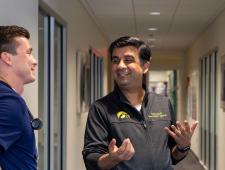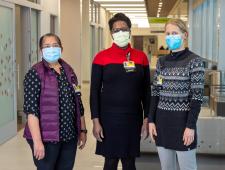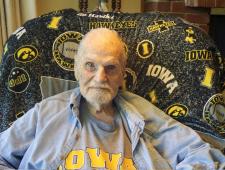Table of ContentsClose
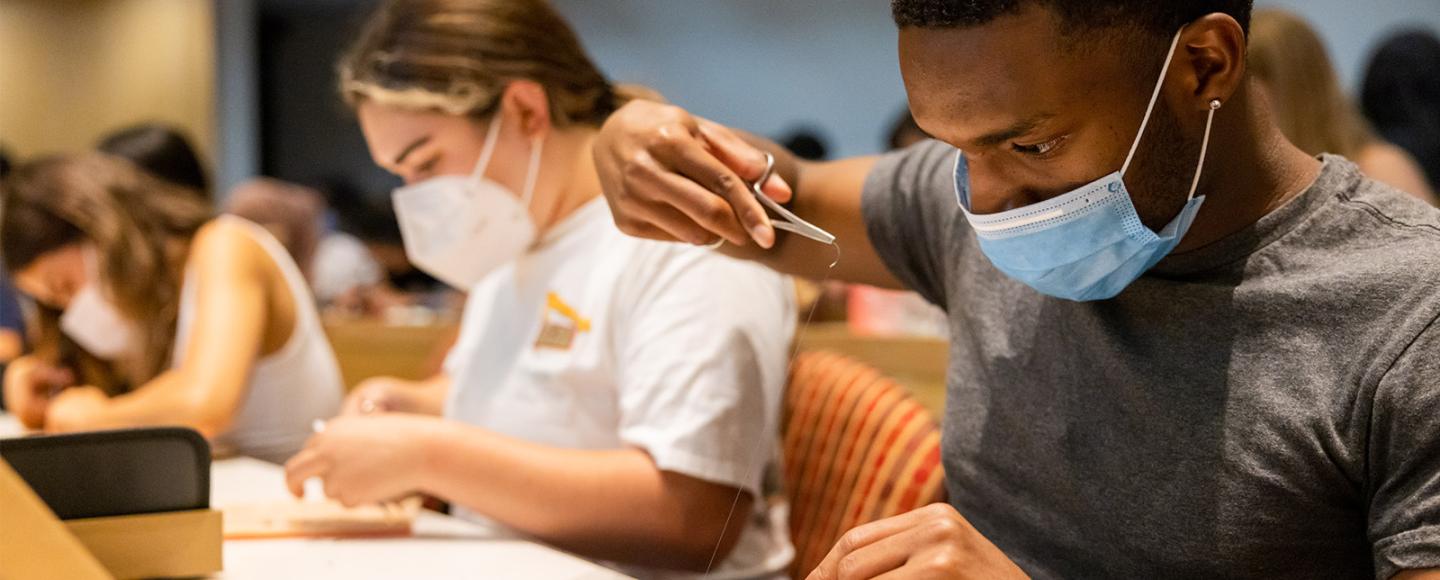
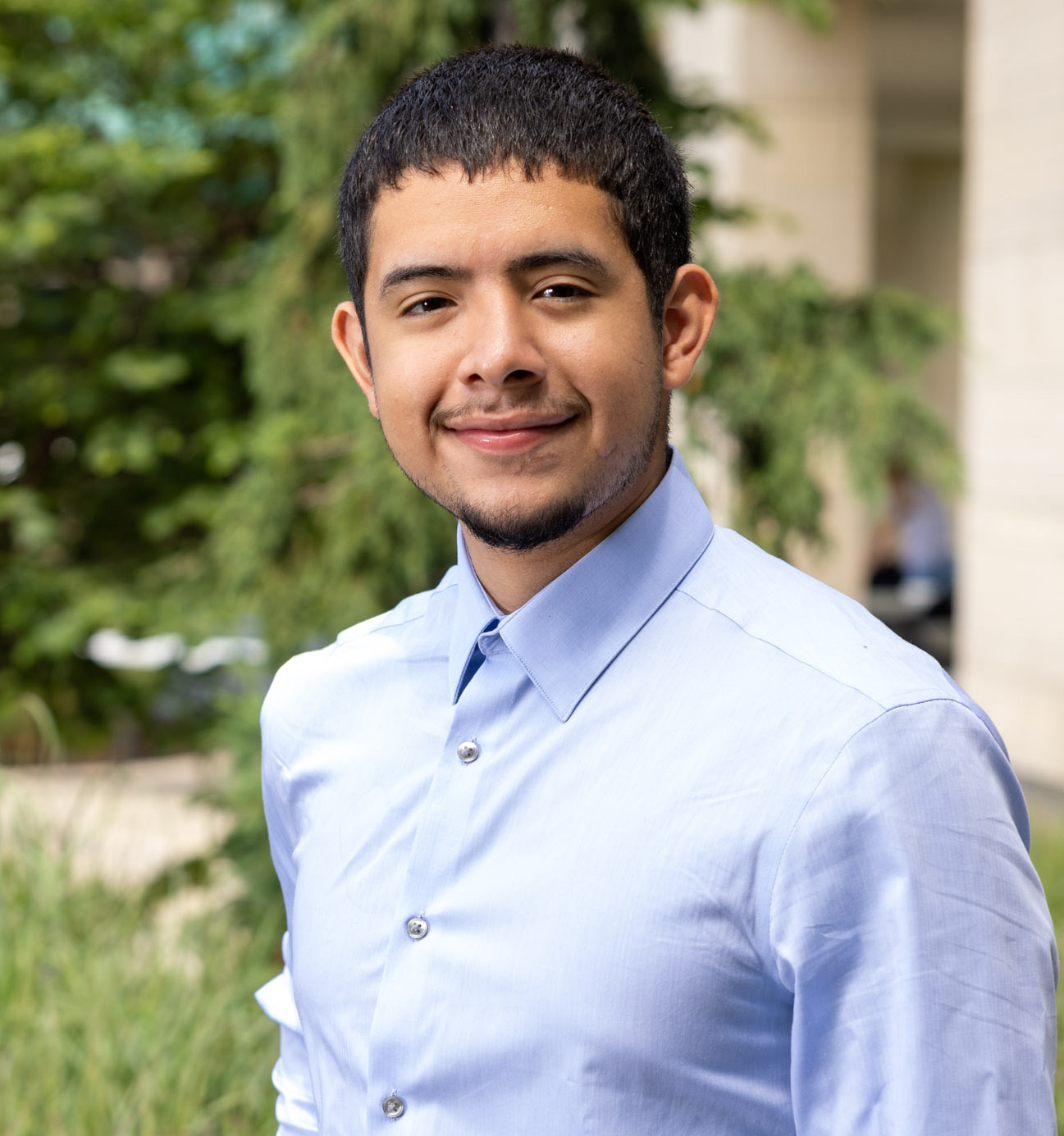
Carlos Valencia , a University of Maryland junior from Silver Spring, Maryland, grew up in a family that experienced health care inequalities firsthand.
“My family didn’t have easy access to, and couldn’t afford, health care,” Valencia says. “We were a long drive away from the nearest health care options. My parents did not speak English at the time, and I had to translate. I felt like I was a bridge to getting them access, and I wanted to do something about it.”
As Valencia considers the physician he aims to become, he wants to continue to be a bridge for patients and families. Patients seen by providers with whom they share identity factors, like race and language, have better clinical outcomes on average, but roughly 23% of Hispanic/Latinx adults report that they are the same race and ethnicity as their usual provider, and that they speak their preferred language, according to the Urban Institute . Additionally, just 22.2% of Black adults report that their provider shares their race.
“Having a diverse health care system really benefits all patients,” says Denise Martinez, MD (11R), interim University of Iowa Health Care associate vice president for health parity. “Bringing a variety of different perspectives to the table can offer unique approaches and solutions.”
Diversity in medicine leads to equity in the workforce and a diversity of knowledge, background, and opinion that can improve care. But these aspirations can only be achieved if students from diverse backgrounds believe in their own potential to become medical professionals—and have the means to realize that potential.
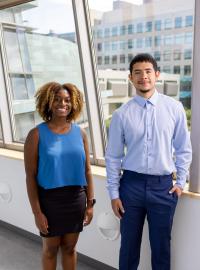
OFFICE OF DIVERSITY, EQUITY, AND INCLUSION
Mindful of all aspects of human difference, the Office of Diversity, Equity, and Inclusion strives to create a welcoming and inclusive culture across UI Health Care.
SHPEP: A launching pad for a career in medicine
This summer, Valencia was among 80 participants in the Carver College of Medicine’s annual Summer Health Professions Education Program (SHPEP). These scholars—college freshmen and sophomores from across the country and the world—are from backgrounds considered underrepresented in medicine, including students from rural areas, low-income backgrounds, ethnic and racial minorities, and first-generation college students.
SHPEP scholars can choose to focus their learning on medicine, dentistry, public health, or pharmacy. Students in the medical track, like Valencia, get face time with physicians from varied specialties and opportunities to explore areas of medicine through hands-on learning.
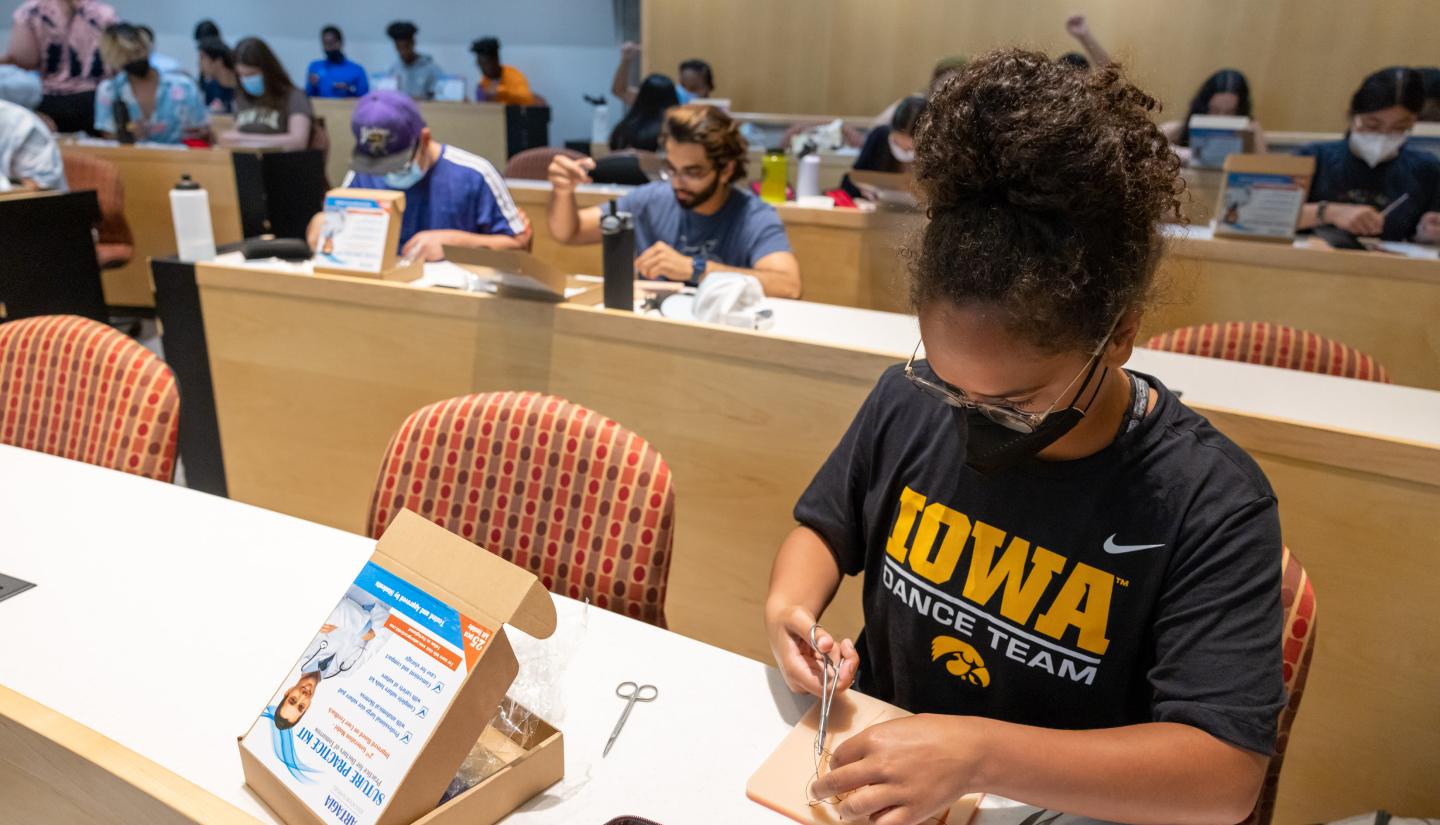
“The goal of the program is to help students understand the paths that are available to them in health care and to give them the tools, the resources, and the mentorship to be successful,” says Martinez, who is also associate dean of diversity, equity, and inclusion in the Carver College of Medicine.
Students who complete the medicine track are guaranteed an interview if they choose to apply to the Carver College of Medicine. Iowa is one of 12 academic medical institutions nationwide to offer SHPEP, and the program is funded by grants from the Association of Academic Medical Colleges and the Robert Wood Johnson Foundation.
Martinez herself completed SHPEP 20 years ago at the University of Washington and became the first physician in her family. In 2017, she helped bring SHPEP to Iowa. Now, in addition to leading the program, she provides one-on-one mentorship to SHPEP scholars.
“Seeing myself in these students, knowing a lot of the obstacles that they are going through, and knowing that we are creating the resources they need to succeed brings me so much joy,” Martinez says. “People are given the courage, the hope, and the tools to get where they want to be.”
Follow-up surveys show that dozens of SHPEP scholars have made it into medical school or other health professions—such as physical therapy, nursing, or health care administration—since the program was established at Iowa.
Stories of SHPEP
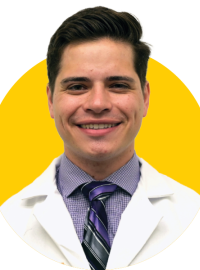
Andrew McKeen (2018 SHPEP Scholar)
McKeen is a second-year medical student in the Carver College of Medicine from Woodbury, Minnesota.
“I genuinely don’t think I would be in med school without SHPEP. I always tell people: Name another time you’ll have unfettered access to physicians, mentors, faculty, staff that are genuinely invested in you. Those six weeks were incredibly informative and provided me with mentors that I still talk to at least once a month, in addition to great friends.”
Future Goals:
“I want to use my ability to speak Spanish to help patients whose primary language is Spanish. Hopefully I can follow in the footsteps of Dr. Martinez wherever I end up, being involved with a mobile clinic.”

Nia Russell (2022 SHPEP Scholar)
Russell is a junior at North Carolina A&T State University from Chicago, Illinois.
“I really love the lectures. Dr. Martinez and Mrs. Galpin [Monique Galpin, SHPEP coordinator] bring in different physicians to talk to us not only about their triumphs but also about their struggles, which a lot of them have. It’s been very reassuring that these physicians, pharmacists, public health professionals, and dentists were all once in my shoes.”
Future Goals:
“The pandemic hit when I was a senior in high school, and I struggled with some mental health issues. I started seeing a therapist, and through that I learned that I was interested in pediatric psychology.”
Personalized prep to improve MCAT scores
SHPEP has shown to be a valuable resource for students in the past five years, but when scholars complete the program, they are still at least two years out from applying to medical school. The next obstacle to overcome is the cost and scope of preparing for the Medical College Admission Test (MCAT).
Thanks to a generous gift from Chuck and Shanna Gauger of Portland, Oregon, the college will soon support SHPEP scholars in this next phase. The gift carries on the legacy of Chuck’s father, John “Doc” Gauger (MD39), and Chuck’s brother, David Gauger (MD69).
“Doc was a country doctor. He drove upwards of a hundred miles a day to attend to people’s needs in rural farm communities,” says Shanna Gauger. “And David was a unique, sensitive individual. I think they both would be extremely supportive of a program like this.”
Martinez and the Gaugers collaborated to form the plan for using David’s estate to help under-represented students achieve the MCAT scores they need to enter medical school.
"I wanted to make an impact at a broader level,” says Shanna Gauger. “Denise’s idea of a free MCAT preparatory course really resonated with us because it provides the technical knowledge, test-taking experience, and very importantly, the networking that these individuals need to increase their confidence.”
“The cost to do an MCAT prep course is often $5,000,” Martinez says. “The free prep course is just a way for us to continue to help the students we are already connected with through SHPEP.”
Students of the MCAT prep course, all former SHPEP scholars, will be coached on test-taking skills and managing test anxiety, and they will measure their progress with a weekly practice test during the second half of the course.
“It’s important to us not only to inspire students but also to provide them concretely with resources and tools that will help them get into medical school and succeed,” says Nicole Del Castillo, MD, MPH (14R), director of the college’s DEI office. “The program will give them some structure and framework around studying for the MCAT as well as tutoring support to keep them accountable through their studying process.”
Students will learn study skills in large-group seminars and engage in small-group sessions to clarify and ask questions. Two Iowa medical students are collaborating with the DEI office to construct the course’s curriculum, using their own experience as recent medical school applicants to inform their decisions.
Will Tsai, a second-year medical student who was born in Taiwan and grew up in Irvine, California, recalls his own struggles preparing for the MCAT.
“I ended up taking the test twice,” he says. “My second time, I looked into test preparation classes, but I couldn’t afford it as a student. I ended up studying on my own. Afterwards, I wanted to help other students, so I got into MCAT tutoring. When this opportunity came up, I knew I had to be a part of it.”
The course will launch in spring 2023 with current medical students serving as lead tutors. According to Tsai, the mentorship of current medical students will be invaluable to the course’s students.
“It can be easy to feel lost,” Tsai says. “We’re hoping that we can provide them with quality resources and give them mentorship with med students who have gone through it before.”
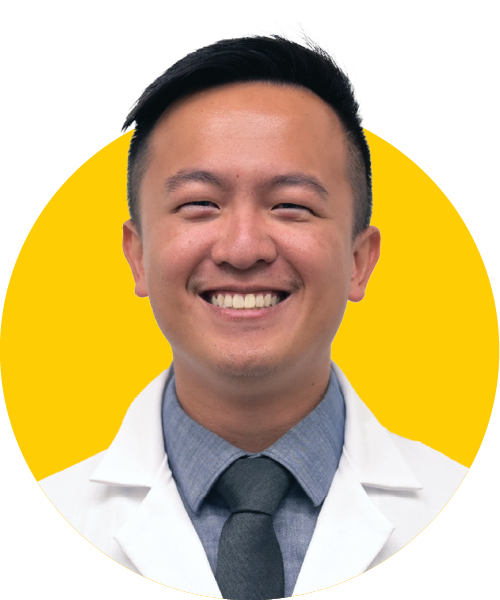
M2, Carver College of Medicine
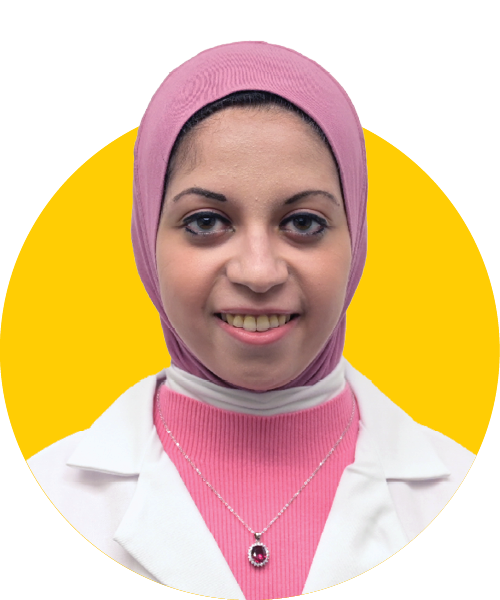
M2, Carver College of Medicine
Maram El-Geneidy, a second-year medical student from Bettendorf, Iowa, says she and Tsai hope to teach students how to prepare for the test independently.
“We’re not trying to give them all the information,” says El-Geneidy. “We want them to understand how to train themselves for the test.”
Tsai and El-Geneidy are taking a different approach than most medical schools’ preparatory programs.
“Every person who takes the test has a different, individualized journey and schedule. In this class, we’ll be leaving room for students to adapt to their strengths and weaknesses and their own pace,” El-Geneidy says.
Del Castillo hopes to recruit 16-20 scholars and five or six student tutors for the pilot program. Since SHPEP scholars come from all over the country, the MCAT prep course will remain permanently virtual to accommodate the broadest group of students possible.
For students like Valencia, the additional support could make all the difference.
“From communicating and learning how to network, to a clearer path to becoming a physician, to meeting people from different cultures, SHPEP will help me in every single way to become a better physician someday,” Valencia says. “I have a passion for working with underserved populations, because that’s where I came from. I want to help others. I want to close the gap.”
Paving the pathway
The path to greater representation in the health care workforce starts with nurturing kids’ interest as early as grade school, and it continues through the transition into health careers. The Carver College of Medicine is paving the way with outreach programming and support.
K-12 students across Iowa engage in hands-on activities that foster interest in science, technology, engineering, and mathematics.
Underrepresented undergraduates spend a half day each semester job shadowing physicians from 17 UI Health Care departments.
Medical-track students are given time with physicians and the opportunity to explore areas of medicine with hands-on activities that help them envision what it might be like to be a physician themselves
Pre-health undergraduates receive support and mentorship to familiarize themselves with health fields and motivate them as they continue into the next phase of their careers.
Students receive mentorship from current medical students and are provided resources for a flexible and individualized MCAT preparation plan.
These organizations offer a place for underrepresented students to connect, network, and address the unique challenges of navigating health professions with their given identities.
Visiting fourth-year medical students can receive a stipend to take a four-week elective clerkship in one of 13 specialties.
Underrepresented interns, residents, and fellows are provided with professional development opportunities through seminars and faculty panel discussions.

